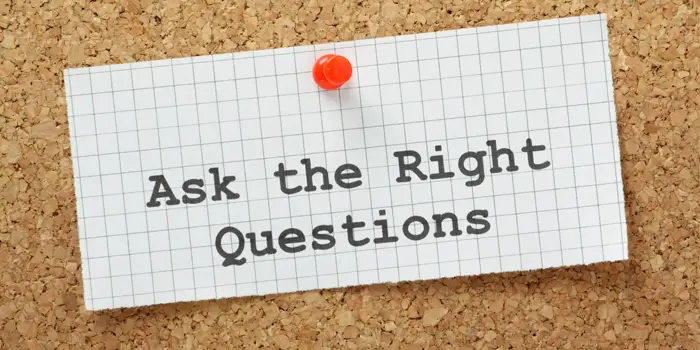When it comes to a Teaching Assistant interview, preparation is key. To give yourself the edge over other candidates, you’ll need to know the types of interview questions for teaching assistants that are likely to be asked, and how best to answer them.
Types of Interview Questions for Teaching Assistants
While it is very much impossible to predict what Teaching Assistant interview questions you will be asked on the day, you can expect most of them to fall into these categories:
- Safeguarding interview questions
- Time management questions
- Classroom management questions
- Competency-based questions
- Your qualification and experience
19 Interview Questions and Answers for Teaching Assistants

1. Why do you want to be a teaching assistant?
Sample Answer: There are actually several reasons why I would like to be a Teaching Assistant. First and foremost, I have a passion for teaching and helping children learn.
Secondly, being a Teaching Assistant would allow me to gain valuable experience in the field of education which could eventually lead to my dream career of becoming a teacher.
Finally, I believe that being a Teaching Assistant would be a personally rewarding experience as I would be able to make a difference in the lives of my students.
2. What experience do you have working with children?
Sample Answer: I have plenty of experience working with children. I’ve been a babysitter to my younger sister for as long as I can remember, and I’ve also worked as a camp counsellor and a swimming instructor (add your own previous experiences here). I’m patient and good at coming up with fun activities to keep children engaged.
3. What do you think are the most important qualities of a good teaching assistant?
Sample Answer: In my opinion, some of the most important qualities a teaching assistant can possess are patience, creativity, and the ability to adapt to different situations.
I know from experience that children can be unpredictable, so it’s important to be able to think on your feet and come up with new ideas when needed. It’s also essential to be patient in order to deal with challenging behaviour calmly and effectively.
4. Why should we hire you as a teaching assistant?
Sample Answer: I am very passionate about teaching. I believe that every child has the potential to learn and succeed, and I would love to help them reach their full potential. I am also very patient, efficient, and organized, which are all qualities I believe are essential for a successful teaching assistant.
5. How do you deal with disruptive students in your class?
Sample Answer: I believe that every student has the right to an education, so I would never give up on a disruptive student. Instead, I would work hard to find a way to reach them and help them succeed.
I would talk to them privately to try and understand the reasons for their behaviour, and then work with them to come up with a plan to improve their behaviour. I would also continue to monitor their behaviour closely, and provide support and encouragement along the way.
6. What do you think is the best part about being a teaching assistant?
Sample Answer: For me, the best part of being a teaching assistant is the feeling I get knowing that I am helping to make a difference in the lives of my students. It’s also very rewarding to see the progress my students make throughout the year and know that I played a part in their success.
7. What do you think is the most challenging part of being a teaching assistant?
Sample Answer: I would say one of the most challenging things a Teaching Assistant can face is a child or group of children being disruptive in class.
I know for a fact that It can be difficult to keep the class on track when there are students who are not cooperating, and it can be even more difficult to get those students to change their behaviour.
However, I also believe that it is important to persevere and I will of course continue to try my best in those situations.
8. What do you think are the most important lessons children can learn in school?
Sample Answer: Besides the essentials like reading and writing, I also believe that it’s important for children to learn about topics such as respect, cooperation, and empathy. These are lessons that can be applied in their everyday lives, and I think they are essential for developing well-rounded individuals.
9. What do you think is the best way to motivate students?
Sample Answer: I believe that every child is different, and therefore there is no one-size-fits-all answer to this question.
However, I think it’s important to try and find out what motivates each individual child, and then use that to help them succeed. For some students, it may be praise or rewards, while others may respond better to competition or challenges.
10. What do you think is the best way for a teaching assistant to build a rapport with their students?
Sample Answer: I believe that the best way for a teaching assistant to build a rapport with their students is by being friendly, approachable, and patient. I also think it’s important to take an interest in your students’ life and get to know them as individuals.
11. What do you think are the key responsibilities of a teaching assistant?
Sample Answer: I believe that the key responsibilities of a teaching assistant are to provide support and assistance to both teachers and students, and to create a positive learning environment.
I also think it’s important to be a good role model for students and to promote respect, cooperation, and empathy into the roots of every child.
12. How do you deal with parental complaints?
Sample Answer: If I received a parental complaint, I would take the time to listen to their concerns and try to understand where they are coming from.
With the help of the class teacher, I would then work with them to come up with a solution that would be beneficial for both the parent and the child.
I would also keep the lines of communication open, and continue to update the parent and class teacher on the matter.
13. Do you have any particular strategies for working with students who struggle in class?
Sample Answer: For students who struggle in class, I would offer to provide additional support and assistance. This could include one-on-one tutoring sessions, or working with them on specific areas that they are struggling with.
I would also aim to create a positive learning environment for them, and try to make every lesson fun and enjoyable.
14. Have you ever had to deal with a situation where a student was behaving inappropriately towards you or another student? If so, how did you handle it?
Sample Answer: Yes, I have had to deal with a situation where a student was behaving inappropriately towards another student. I handled it by first speaking to the student privately and explaining to him why his behaviour was inappropriate.
I then worked with the class teacher to come up with a plan of action that would help the student change his behaviour. This plan included things like additional support and supervision, as well as setting clear expectations and consequences for his actions.
15. What do you think is the best way to deal with difficult behaviour from students?
Sample Answer: I think the best way to deal with difficult behaviour from students is by remaining calm and level-headed at all times. It’s also important to address the behaviour directly and explain to the student why it is unacceptable.
With the help of the class teacher, it’s also important to come up with a plan of action that will help the student change their behaviour.
16. What do you think is the best way to deal with a student who is having personal problems?
Sample Answer: If a student is having personal problems, I think it’s important to take the time to listen to their concerns and offer support and assistance where possible.
It’s also important to respect the student’s privacy and only share information with those who need to know. The class teacher for example.
17. What do you think is the best way to deal with a student who is underachieving?
Sample Answer: If a student is underachieving, I think it’s important to speak to them privately and find out why this may be the case. There could be a number of reasons why a student is underachieving, and it’s important to get to the root of the problem.
Once the reason is established, steps can then be taken to help the student improve their performance. This could include additional support and assistance, as well as setting clear goals and expectations.
18. Do you have any advice for new teaching assistants?
Sample Answer: My advice for new teaching assistants would be to always remain professional and patient. It’s also important to build good relationships with both teachers and students and to always be willing to lend a helping hand.
It’s also very important to stay up to date with new developments in education and to continually strive to improve your own skills and knowledge.
19. Do you have any questions for us?
Sample Answer: Yes, see below.
See Also: 26 SEN Teaching Assistant Interview Questions
Questions to Ask at the End of a Teaching Assistant Interview
After the questioning phase of the interview is over, the interviewer will ask if you have any questions you would like to ask, this is your opportunity to ask any questions that you may have about the role, the students or the school.

Here are a few examples of questions you can ask at the end of a Teaching Assistant interview:
- What are the expectations for Teaching Assistants in terms of lesson planning and delivery?
- What support is available for Teaching Assistants who are struggling with managing behaviour?
- How often do supervision and performance reviews take place for Teaching Assistants?
- What opportunities are there for professional development for Teaching Assistants?
- What resources and facilities are available to Teaching Assistants?
- How much contact time do Teaching Assistants typically have with students?
- What is the school’s policy on dealing with difficult behaviour from students?
- What is the school’s policy on dealing with underachieving students?
- What are the school’s expectations for student progress and achievement?
- How does the school measure the success of its Teaching Assistants?
See Also: Teaching Assistant Courses Online
How to Answer Teaching Assistant Interview Questions
When you’re formulating your answers, it’s important to think about the skills and attributes that are essential to the TA role. These include:
- Patience
- Good communication skills
- Good organisation skills
- Good behaviour management skills
- The ability to work well under pressure
- The ability to use your own initiative
The best way to demonstrate these qualities is by giving examples of how and when you’ve used them in the past.
For example, you could talk about a time when you had to deal with a particularly challenging child, or a time when you had to manage a large group of students.
Either way, always use examples to back up your answers.
Related: 25 Learning Support Assistant Interview Questions
What to Take to a Teaching Assistant Interview

When attending a TA interview, or any interview for that matter, there are a few essential things you should always bring along, these include:
A copy of your resume
It’s always advised to bring along a few copies of your resume just in case you need to go over anything with the interviewer.
A list of references
Bring along a list of references so that the interviewer can easily follow up with people who can vouch for your skills and abilities. Do not use family members or friends in this list.
A portfolio of your past work
If you have any relevant past work, be sure to bring it along to show the interviewer. This could be anything from papers you’ve written to projects you’ve completed.
A notebook and pen
Always come prepared with a notebook and pen so that you can take notes during the interview.
A list of questions for the interviewer (at least 2-3 prepared ahead of time)
Be sure to have a few questions ready to ask the interviewer. This will show that you’re interested in the position and have done your research.
Wrapping up
Overall, teaching assistant interviews can be quite challenging. However, if you’re prepared and have a good understanding of the role, you should be able to answer the questions confidently.
Just remember to focus on your skills and attributes, and give examples of when you’ve used them in the past. Good luck!








I have a TA interview in a few days, thanks for the tips.
Hi Emily,
Thank you very much for writing this article. these questions and answers are really helpful.
Glad to help 🙂